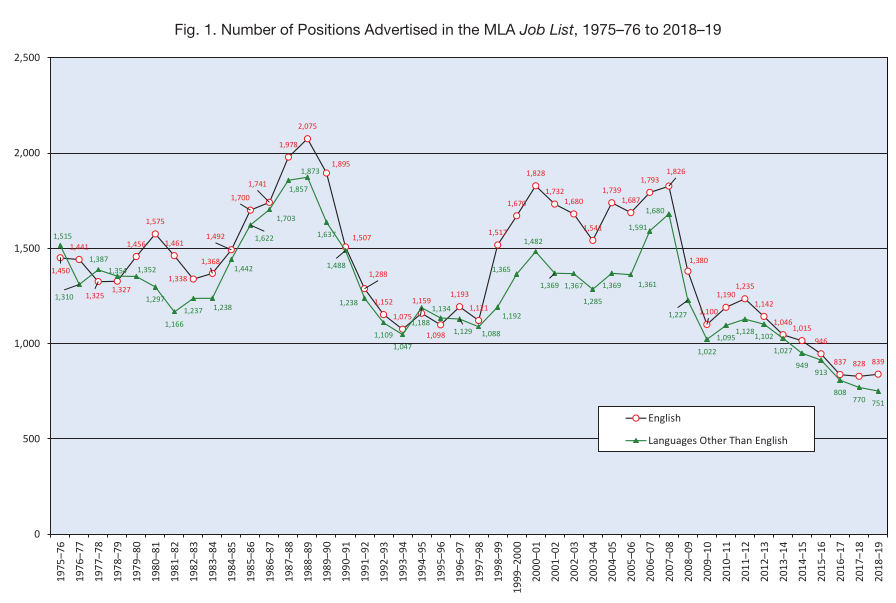Applying to Ph.D. Programs in English
Why get a Ph.D. in English?
Ph.D. programs in English allow you to focus over a long period of time (usually five or six years, sometimes longer) on a relatively precise research area of your own choice and to pursue genuinely new and potentially groundbreaking scholarship. A Ph.D. is also the main requirement for most college-level teaching jobs, whether tenure-track or not (jobs are virtually always designated as either leading to tenure or not at the outset; non-tenure-track jobs tend to emphasize teaching rather than research, and, though it varies a lot, can have fewer guarantees of continued employment). It can also be useful for some other careers, such as those of a university administrator, academic librarian, archivist, or university press editor, though these will often require additional study or experience beyond the Ph.D.
Why not get a Ph.D. in English?
Most estimates of the number of Ph.D.s who get tenure-track jobs in English departments are somewhere between 40% and 50% (though the number dipped lower during the recent recession and has not fully recovered). Since academics often remain on the job market for several years, whether they are ultimately successful or not, it can be a frustrating experience. Once in a tenure-track job, a professor must then work toward getting tenure, which generally requires excellence in teaching and in service to the department as well as writing and publishing research (it is the research requirement that often trips up young academics). Overall public funding for higher education in the humanities has declined in recent years, which means fewer career opportunities for new Ph.D.s.
There is also the problem of getting through the Ph.D. program itself; writing a doctoral dissertation is challenging for all students, and even at the best programs many students never finish or take much longer than they intended (though most programs are designed to be able to be completed in six years, the national average in the humanities is about nine, according to an MLA study).

This chart shows the number of job openings listed per year in the Modern Language Association Job Information List (click image to enlarge). Most permanent (tenure-track) academic teaching jobs for English Ph.D.s are included in the MLA list; many temporary or renewable non-tenure-track jobs are not, nor are administrative jobs for which a Ph.D. might be required or helpful. Source: MLA.
What is required to get into a Ph.D. program?
In short: a clear and convincing statement of purpose, an excellent writing sample, strong faculty recommendations, and for many schools (not all) good GRE scores; programs also expect you to have strengths and interests that complement the program's faculty. Be aware that the number of available slots in Ph.D. programs has declined in recent years, while the number of applicants has grown. This means it is difficult to get into any Ph.D. program (the acceptance rate at many programs is under 10%), regardless of its "ranking" in higher-ed. publications or on the web. Also, be prepared to travel! Applying only to nearby schools will make it much less likely you will get in anywhere, and you want not just to get in somewhere but to find a program that would suit you.
How do I choose programs to apply to?
You should find out as much about each program as you can, through its website and other resources. Look for faculty (preferably more than one) who do work in your area; look up their work in the MLA Bibliography and see if it's the kind of thing that excites you. If the website lists what previous graduates are doing, see if it's the kind of thing you'd like to do (these lists can give you a sense of how well each program gets its students jobs). Also consider the funding that is available for doctoral students (are all admitted students guaranteed funding or must they compete with each other?) and what kinds of teaching they are asked to do (teaching experience is essential, but too much can make it hard to finish a dissertation).
Be aware that most academics like to make up their own minds about how good a Ph.D. program is. Thus, lists of schools ranked by reputation are often not that useful, since in a particular subfield a program could be very highly regarded even if it is not in other fields. However, some well-known programs may be unusually successful at getting teaching jobs for their graduates.
Resources
The Modern Language Association offers a number of resources useful to potential doctoral students in English on their website. The career resources page has reports on employment rates for Ph.D.s, average debt carried, and other information.
The website PhDs.org (which uses data from the National Research Council) has prepared a customizable ranking of graduate programs. These rankings differ considerably from those prepared by commercial publications like US News, a good indication of how difficult it is to assess programs.
Ultimately the best resource is your professors, particularly those with expertise in the field in which you are most interested.
The M.A. Program and the Ph.D.
Some Ph.D. programs require a completed M.A. to enter, some only take students without an M.A., and some take students either with or without one. The UToledo M.A. program is designed to give students flexible career options, including teaching with an M.A. alone, as well as preparation for entering a doctoral program. Ph.D. programs our recent M.A. students have attended include Northeastern and Rice University and the Universities of Rhode Island, Arizona, New Mexico, Oklahoma, Louisiana–Lafayette, West Virginia, and Nevada–Las Vegas.


